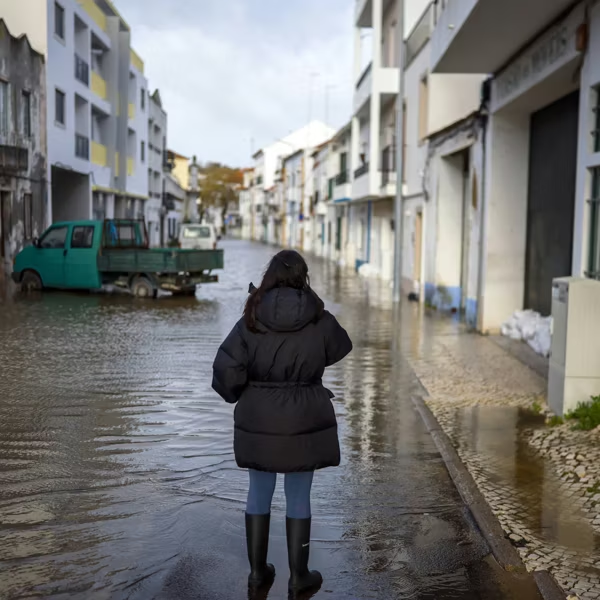
Detail of the cover for Public Citizen's new report, 'Call It a Crisis': The Role of U.S. Network News in Communicating the Urency of Climate Change. (Image: Public Citizen)
'Call It a Crisis': New Report Details Failure of Cable and Network Outlets to Accurately Describe Climate Emergency
"Words matter."
Name and shame.
That's the dual directive from a new report that calls on news organizations to use appropriate language when discussing the climate crisis--even as the report calls them out for inaction.
The report--titled "'Call It a Crisis': The Role of U.S. Network News in Communicating the Urency of Climate Change" (pdf)--analyzed the coverage of ABC, NBC, CBS, CNN, MSNBC, and Fox News to determine just how much urgency the influential outlets bring to their reporting.
According to David Arkush, managing director of Public Citizen's Climate Program, the specific words that journalists and news anchors use--or choose not to use--matters.
"The words we use to characterize an issue make a difference in how it is perceived and prioritized politically," said Arkush.
When outlets with massive nightly audiences like the ones the report studied "consistently fail to use language that conveys that climate change is a crisis or emergency," Arkush added, "they unwittingly put a heavy thumb on the scale in favor of complacency and inaction."
Fox News was the worst offender, with the use of "climate crisis" coming in for only five mentions during the coverage period--all of which, as Public Citizen noted, were efforts to "minimize the issue with false logic, mockery or misinformation." But other news networks weren't much better than the conservative channel.
The only network to use the term in double digits was CNN, and only 16 of the 26 mentions were by a host. Van Jones, whose eponymous show ran every other Sunday during the survey period, accounted for six of those mentions.
Networks should name the problem clearly to avoid confusion, said Allison Fisher, outreach director for Public Citizen's Energy Program.
"Climate coverage on broadcast and cable television news is still at best spotty and at worst riddled with misinformation," Fisher said. "Calling it a crisis indicates that the stakes are high and that the issue is urgent. Most of all it signals to viewers that the time to act on climate is now."
How to report on the climate crisis has long been an issue for news organizations. In July 2018, MSNBC host Chris Hayes said on Twitter that while he was personally invested in the story, the topic was "a palpable ratings killer."
"So the incentives are not great," said Hayes.
An Urgent Message From Our Co-Founder
Dear Common Dreams reader, The U.S. is on a fast track to authoritarianism like nothing I've ever seen. Meanwhile, corporate news outlets are utterly capitulating to Trump, twisting their coverage to avoid drawing his ire while lining up to stuff cash in his pockets. That's why I believe that Common Dreams is doing the best and most consequential reporting that we've ever done. Our small but mighty team is a progressive reporting powerhouse, covering the news every day that the corporate media never will. Our mission has always been simple: To inform. To inspire. And to ignite change for the common good. Now here's the key piece that I want all our readers to understand: None of this would be possible without your financial support. That's not just some fundraising cliche. It's the absolute and literal truth. We don't accept corporate advertising and never will. We don't have a paywall because we don't think people should be blocked from critical news based on their ability to pay. Everything we do is funded by the donations of readers like you. Will you donate now to help power the nonprofit, independent reporting of Common Dreams? Thank you for being a vital member of our community. Together, we can keep independent journalism alive when it’s needed most. - Craig Brown, Co-founder |
Name and shame.
That's the dual directive from a new report that calls on news organizations to use appropriate language when discussing the climate crisis--even as the report calls them out for inaction.
The report--titled "'Call It a Crisis': The Role of U.S. Network News in Communicating the Urency of Climate Change" (pdf)--analyzed the coverage of ABC, NBC, CBS, CNN, MSNBC, and Fox News to determine just how much urgency the influential outlets bring to their reporting.
According to David Arkush, managing director of Public Citizen's Climate Program, the specific words that journalists and news anchors use--or choose not to use--matters.
"The words we use to characterize an issue make a difference in how it is perceived and prioritized politically," said Arkush.
When outlets with massive nightly audiences like the ones the report studied "consistently fail to use language that conveys that climate change is a crisis or emergency," Arkush added, "they unwittingly put a heavy thumb on the scale in favor of complacency and inaction."
Fox News was the worst offender, with the use of "climate crisis" coming in for only five mentions during the coverage period--all of which, as Public Citizen noted, were efforts to "minimize the issue with false logic, mockery or misinformation." But other news networks weren't much better than the conservative channel.
The only network to use the term in double digits was CNN, and only 16 of the 26 mentions were by a host. Van Jones, whose eponymous show ran every other Sunday during the survey period, accounted for six of those mentions.
Networks should name the problem clearly to avoid confusion, said Allison Fisher, outreach director for Public Citizen's Energy Program.
"Climate coverage on broadcast and cable television news is still at best spotty and at worst riddled with misinformation," Fisher said. "Calling it a crisis indicates that the stakes are high and that the issue is urgent. Most of all it signals to viewers that the time to act on climate is now."
How to report on the climate crisis has long been an issue for news organizations. In July 2018, MSNBC host Chris Hayes said on Twitter that while he was personally invested in the story, the topic was "a palpable ratings killer."
"So the incentives are not great," said Hayes.
Name and shame.
That's the dual directive from a new report that calls on news organizations to use appropriate language when discussing the climate crisis--even as the report calls them out for inaction.
The report--titled "'Call It a Crisis': The Role of U.S. Network News in Communicating the Urency of Climate Change" (pdf)--analyzed the coverage of ABC, NBC, CBS, CNN, MSNBC, and Fox News to determine just how much urgency the influential outlets bring to their reporting.
According to David Arkush, managing director of Public Citizen's Climate Program, the specific words that journalists and news anchors use--or choose not to use--matters.
"The words we use to characterize an issue make a difference in how it is perceived and prioritized politically," said Arkush.
When outlets with massive nightly audiences like the ones the report studied "consistently fail to use language that conveys that climate change is a crisis or emergency," Arkush added, "they unwittingly put a heavy thumb on the scale in favor of complacency and inaction."
Fox News was the worst offender, with the use of "climate crisis" coming in for only five mentions during the coverage period--all of which, as Public Citizen noted, were efforts to "minimize the issue with false logic, mockery or misinformation." But other news networks weren't much better than the conservative channel.
The only network to use the term in double digits was CNN, and only 16 of the 26 mentions were by a host. Van Jones, whose eponymous show ran every other Sunday during the survey period, accounted for six of those mentions.
Networks should name the problem clearly to avoid confusion, said Allison Fisher, outreach director for Public Citizen's Energy Program.
"Climate coverage on broadcast and cable television news is still at best spotty and at worst riddled with misinformation," Fisher said. "Calling it a crisis indicates that the stakes are high and that the issue is urgent. Most of all it signals to viewers that the time to act on climate is now."
How to report on the climate crisis has long been an issue for news organizations. In July 2018, MSNBC host Chris Hayes said on Twitter that while he was personally invested in the story, the topic was "a palpable ratings killer."
"So the incentives are not great," said Hayes.

